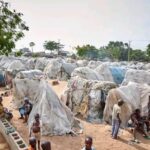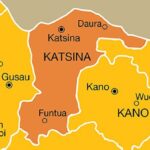Governor Nasir El-Rufai has explained that insecurity in Kaduna State is being perpetrated by criminal elements who have been killing, kidnapping people and rustling cattle the entire North West.
The governor explained that the criminality of the bandits gets coated with ethnic and religious hues when it affects communities in the southern parts of the state, where it tends to exacerbate communal tensions and pitch people who have lived peacefully together against each other.
El-Rufai stated that his government has taken major steps to secure the area, including ensuring that a military base was opened in southern Kaduna along with two mobile police squadrons, answering a decades-long demand for enhanced security presence in the area.
The governor who made this known in a media chat, said that attacks by bandits are not localised to a single part of the state, noting that “these criminals attack people irrespective of their religion or ethnicity and they have been perpetrating their reign of terror in Giwa, Birnin Gwari and parts of Igabi local government.’’
According to him, these bandits operate mostly in Katsina, Zamfara and Niger states and their attacks in those states are seen and reported as criminal activity, but these same attacks are perceived differently when they occur in southern Kaduna and are invested with ethno-religious colorations.
The governor further explained that when bandits attack in southern Kaduna, security reports show that youths from the affected communities have often responded by mobilising to attack Fulani communities in their area whose members share the same ethnicity with the presumed bandits, even though many Fulani communities are also themselves victims of the bandits, in Kaduna State and elsewhere.
El-Rufai noted that the problem is worsened by the response of Fulani communities who often resort to self-help when they are attacked, neglecting to report to traditional authorities or security agents to resolve the matter, opting instead for revenge.
“This is how the cycle of attacks, revenge and reprisals occurs in southern Kaduna,’’ he said.
El-Rufai explained what compelled the state government to impose 24-hour curfew in Zangon Kataf and Kauru local governments on 11 June 2020, following the discovery of the corpse of a man from Kauru, who was resident in Zangon Kataf.
Subsequently, some youths barricaded roads and burnt a vehicle with its occupants. Security agencies had to use force to disperse them from the highway, he said.
Although the June 5, 2020 dispute over a farmland was between Atyap and the Hausa community in Zango, several Fulani settlements were attacked in the events of June 11, 2020, with people killed and houses burnt, he added.
The governor said that his administration decided to set up a White Paper Committee to draft the government’s position on the reports of the Justice Rahila Cudjoe Commission of Inquiry into the 1992 Zangon-Kataf crisis and the 1995 report of the AVM Usman Muazu Committee in order to find a permanent solution to these violent conflicts in Zangon-Kataf.
El-Rufai disclosed that dispute over a farmland was identified as a trigger of the May 1992 crisis, and that such a dispute also flared up on June 5, 2020.
The intervention of community leaders was believed to have contained tensions until violence broke out again on June 11, 2020, he added.
The governor said that it is right for the government to initiate the White Paper process as part of a comprehensive approach to solve the problem in Zangon-Kataf local government and restore peace in the area.

 Join Daily Trust WhatsApp Community For Quick Access To News and Happenings Around You.
Join Daily Trust WhatsApp Community For Quick Access To News and Happenings Around You.

